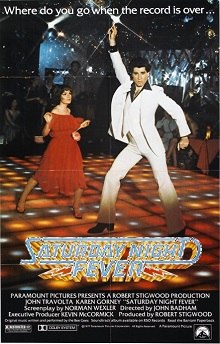Saturday Night Fever
| Saturday Night Fever | |
|---|---|

Theatrical release poster
|
|
| Directed by | John Badham |
| Produced by | Robert Stigwood |
| Screenplay by | Norman Wexler |
| Based on |
Tribal Rites of the New Saturday Night by Nik Cohn |
| Starring | |
| Music by | |
| Cinematography | Ralf D. Bode |
| Edited by | David Rawlins |
|
Production
company |
|
| Distributed by | Paramount Pictures |
|
Release date
|
|
|
Running time
|
118 minutes |
| Country | United States |
| Language | English |
| Budget | $3.5 million |
| Box office | $237.1 million |
Saturday Night Fever is a 1977 American musical-drama film directed by John Badham and starring John Travolta as Tony Manero, a working-class young man who spends his weekends dancing and drinking at a local Brooklyn discothèque; Karen Lynn Gorney as Stephanie Mangano, his dance partner and eventual confidante; and Donna Pescow as Annette, Tony's former dance partner and would-be girlfriend. While in the disco, Tony is the champion dancer. His circle of friends and weekend dancing help him to cope with the harsh realities of his life: a dead-end job, clashes with his unsupportive and squabbling parents, racial tensions in the local community, and his general restlessness.
The story is based upon a 1976 New York magazine article by British writer Nik Cohn, "Tribal Rites of the New Saturday Night"; in the mid-1990s, Cohn acknowledged that he fabricated the article. A newcomer to the United States and a stranger to the disco lifestyle, Cohn was unable to make any sense of the subculture he had been assigned to write about; instead, the character who became Tony Manero was based on a Mod acquaintance of Cohn's. In 2010, the film was deemed "culturally, historically, or aesthetically significant" by the Library of Congress and selected for preservation in the National Film Registry.
A huge commercial success, the film significantly helped to popularize disco music around the world and made Travolta, already well known from his role on TV's Welcome Back, Kotter, a household name. The Saturday Night Fever soundtrack, featuring disco songs by the Bee Gees, is one of the best-selling soundtracks of all time. The film showcased aspects of the music, the dancing, and the subculture surrounding the disco era: symphony-orchestrated melodies; haute couture styles of clothing; pre-AIDS sexual promiscuity; and graceful choreography. The sequel Staying Alive (1983) also starred John Travolta and was directed by Sylvester Stallone.
...
Wikipedia
